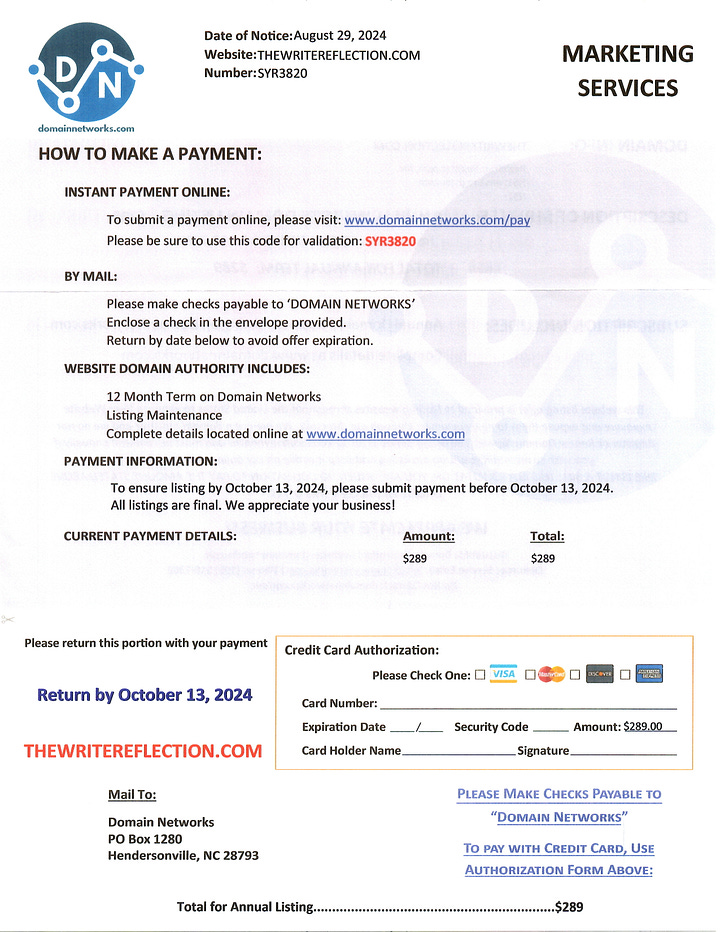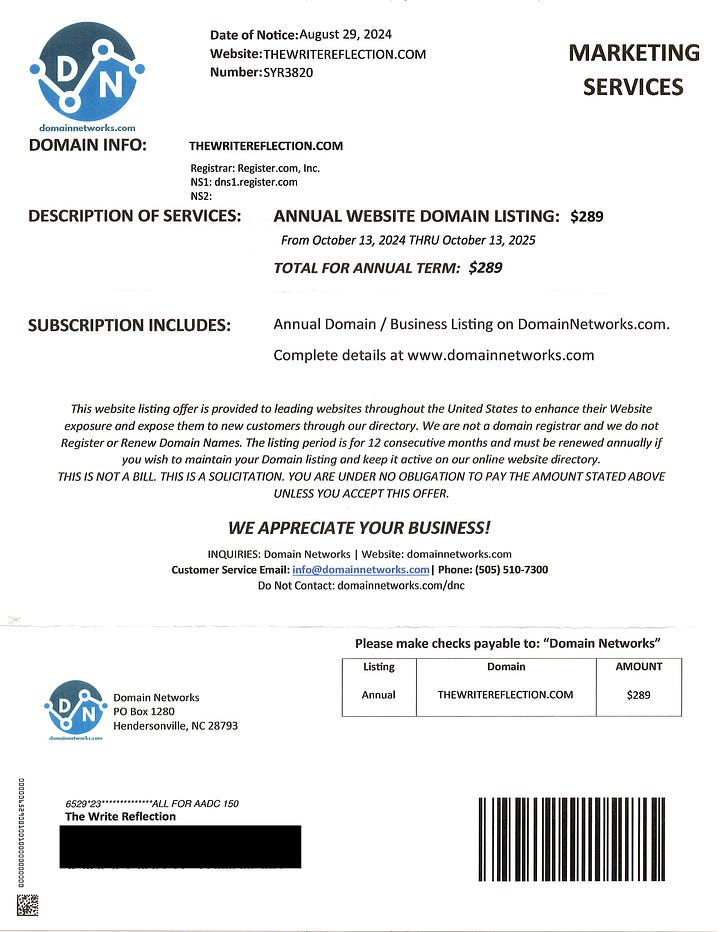Don’t Fall For This Website Domain Marketing Scam
Reading the fine print can save you a huge hassle later
Businesses receive numerous invoices each month. Typically, the larger your operation, the more bills on your desk. Depending on who handles the billing for your company, mistakes can and do happen. It’s easy to accidentally pay a bill that’s not owed.
Some unscrupulous organizations take full advantage, including one that designs its marketing schemes to resemble an unpaid invoice.
Anyone who owns a domain name for their business website has likely found themselves invoiced by a company called Domain Networks. Technically an online business directory – which is nothing more than your business name, address, phone number, and link to your website – the company sends out confusing marketing materials designed to trick the recipient into thinking they’re paying an invoice.
Businesses that have filed complaints against Domain Networks with the Better Business Bureau said they thought they were paying an invoice for renewing their website domains. “This company looks up websites of businesses and sends the businesses unsolicited letters in the mail that are made to look like an invoice,” said one business in its official complaint to the BBB in November 2023. “If you only read one side of the mailing, you would have no idea it isn’t an invoice you owe.”
Another request for BBB assistance from November 2023 said the business sent them multiple invoices that referenced their domain hostname asking them to return payment by a specific date. The person eventually paid the bill, only to receive notification from their real domain host that their domain name expired due to failure to pay. “My domain expired, unable to re-purchase, and had to move to find another domain and host.”
There are nearly 150 similar complaints on the BBB’s website. Other consumer platforms such as Trustpilot and SiteJabber tell the same tale of disgruntled businesses scammed out of money. Some of the warnings were issued by legitimate website designers and SEO professionals whose clients received these fake bills, warning others about the scam.
Is Domain Networks a legitimate company?
Domain Networks publishes an address, phone number, and email on its website. However, those things do not make it a legitimate company.
Domain Networks claims offices in Hendersonville, N.C., and Santa Fe, N.M. The Hendersonville address is for a post office box, while the Santa Fe location goes to a building with several businesses listed for the site. Google Maps doesn’t include Domain Networks as a registered business for the address.
The business lists its official phone number as (505) 510-7300. No one answers the phone if you call the number. You get an automated message that asks you to hold while they direct your call, only to eventually be asked to leave a message with the promise that someone will return your call.
A search in the Secretary of State websites for New Mexico and North Carolina produced zero results. When that happens, it usually indicates a business is not officially registered with the states in which it claims to operate. North Carolina requires all business corporations to register with the Secretary of State before offering services. However, the rule doesn’t apply to sole proprietors. New Mexico has similar mandates.
How can you spot a marketing scam?
Domain Networks has sent me numerous notices cleverly disguised to mimic an invoice for my website domain. I’ve had a business website since 2009. It’s not my first rodeo with renewing the domain name, so I wasn’t as easy to con as some of the others who have fallen for this scheme.
However, one of my clients wasn’t as lucky. He received the notice in the mail, panicked, and paid it promptly for fear of losing his domain name. It was only after he’d submitted his credit card details and agreed to pay the $289 that he became suspicious and contacted me.
With my assistance, he attempted to contact the company to request a refund. He emailed and left a voicemail message. No one ever responded. He ended up disputing the charge with his credit card company to rectify the situation.
How Domain Networks chooses its targets
Wondering how Domain Networks chooses its targets? It’s not difficult for whoever is behind this operation to get all the information they need to send out their invoices.
Publicly available websites such as the Secretary of State for each state in the U.S. and website domain registries like Who.is list the name of the business, the business address, and sometimes the name of the business owner. With Who.is, you can request – and pay for – Proxy Protection to shield your name and address. However, if you’ve registered your business with the state in which it operates, that information doesn’t stay private for long.
Once they have that information, it’s just a matter of sending out their marketing ploy cleverly disguised as an invoice for your annual website domain listing and hoping you fall for it.


Breaking down their marketing services invoice
It’s easy to see how businesses fall for this misleading marketing invoice. The formatting Domain Networks used isn’t a coincidence. Whoever designed it knew exactly what they were doing. On the front of the letter, they include your website, an official identification number, and information about where your domain name is registered front and center on the notification.
As if that wasn’t confusing enough, it states the subscription includes your annual domain/business listing on DomainNetworks.com. It concludes with a form you can detach at the bottom to remit payment.
Now, there is a backside to this notice that includes a disclaimer in small print toward the bottom that states it’s not a bill but a solicitation and that you’re under no obligation to pay the stated amount unless you agree to their offer. However, if you fail to turn the notice over, you’ll miss it.
What can you do if you’ve fallen for the Domain Networks scam?
Why hasn’t the long arm of the law shut Domain Networks down? Technically, they’re not doing anything illegal. The disclaimer included on the backside of their notice essentially covers them legally against charges of fraud. The language might also protect them if anyone sued them civilly.
So, what can you do if, like one of my clients, you’ve fallen for this Domain Networks ruse? One of the first things you should do is try to contact the company to demand a refund. If you don’t get a response by calling or emailing them, go to the BBB’s website and file a complaint. A representative for the company has responded publicly on the BBB’s website with promises for refunds. However, it’s unclear if they issued them.
If you paid via credit card, contact your credit card company and dispute the charge. Most credit card companies require you to wait until the charge is processed before you can dispute it.
Paying by check poses complications that can cost you more money to resolve. The quickest way to stop a check that’s not yet been cashed is by putting a stop payment order on it. How much you’ll be charged for this service varies depending on where you bank.
Lastly, consider filing a complaint with the Federal Trade Commission or your state Attorney General’s office.







